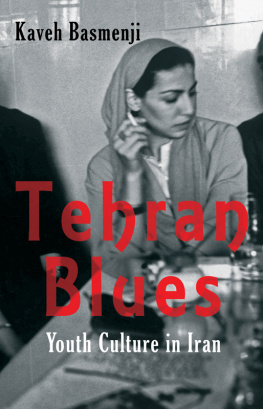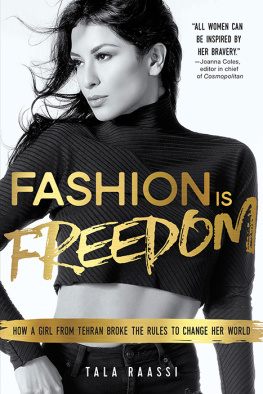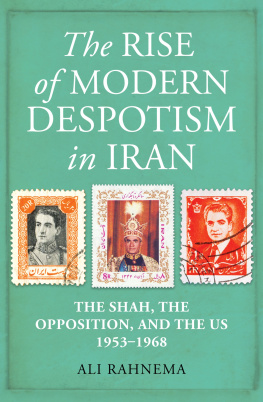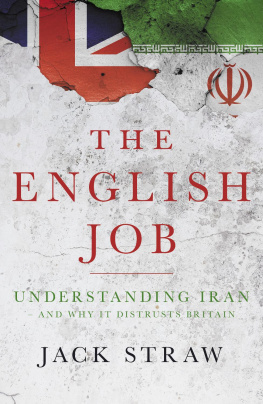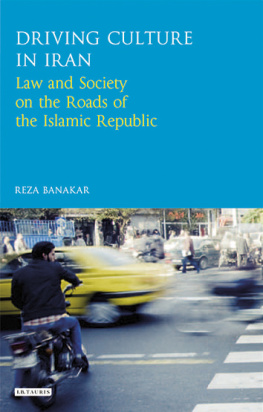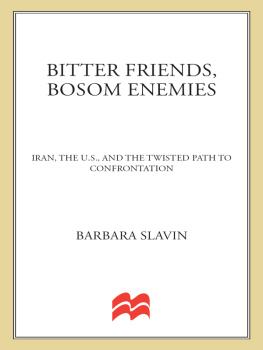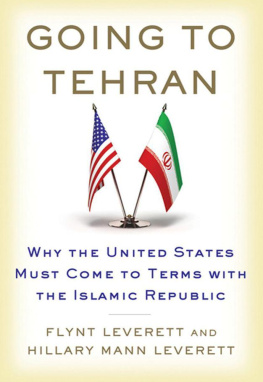Kaveh Basmenji - Tehran Blues: Youth Culture in Iran
Here you can read online Kaveh Basmenji - Tehran Blues: Youth Culture in Iran full text of the book (entire story) in english for free. Download pdf and epub, get meaning, cover and reviews about this ebook. year: 2005, publisher: Saqi Books, genre: Politics. Description of the work, (preface) as well as reviews are available. Best literature library LitArk.com created for fans of good reading and offers a wide selection of genres:
Romance novel
Science fiction
Adventure
Detective
Science
History
Home and family
Prose
Art
Politics
Computer
Non-fiction
Religion
Business
Children
Humor
Choose a favorite category and find really read worthwhile books. Enjoy immersion in the world of imagination, feel the emotions of the characters or learn something new for yourself, make an fascinating discovery.
- Book:Tehran Blues: Youth Culture in Iran
- Author:
- Publisher:Saqi Books
- Genre:
- Year:2005
- Rating:4 / 5
- Favourites:Add to favourites
- Your mark:
- 80
- 1
- 2
- 3
- 4
- 5
Tehran Blues: Youth Culture in Iran: summary, description and annotation
We offer to read an annotation, description, summary or preface (depends on what the author of the book "Tehran Blues: Youth Culture in Iran" wrote himself). If you haven't found the necessary information about the book — write in the comments, we will try to find it.
Tehran Blues: Youth Culture in Iran — read online for free the complete book (whole text) full work
Below is the text of the book, divided by pages. System saving the place of the last page read, allows you to conveniently read the book "Tehran Blues: Youth Culture in Iran" online for free, without having to search again every time where you left off. Put a bookmark, and you can go to the page where you finished reading at any time.
Font size:
Interval:
Bookmark:
Kaveh Basmenji
How Iranian Youth Rebelled
Against Irans Founding Fathers
SAQI
To the memory of
Babk Dakhili
and to my schoolmates at
Kharazmi highschool
Each in my fond affections claimd a part,
But none discernd the secret of my heart.
Mowlana Jalaloddin Balkhi (Rumi)
(Translated by Sir William Jones)
Yet Ah, that Spring should vanish with the Rose!
That Youths sweet-scented manuscript should close!
The Nightingale that in the branches sang,
Ah whence, and whither flown again, who knows!
Rubaiyat of Omar Khayyam
(Translated by Edward Fitzgerald)
In writing a book on Iranian youth, I should first of all thank dozens of young men and women who shared with me their viewpoints and experiences of living in present-day Iran. I would also like to thank all the experts and analysts who gave me interviews, including Jamshid Arjomand, Dr Sadeq Zibakalam, Mohammad Qaed, Nima Rashedan and Sina Motallebi.
I am also deeply grateful to William A. Samii and Golnaz Esfandiari of Radio Free Europe/Radio Liberty, who provided me with valuable information. Furthermore, I have greatly benefited from the works of Homa Katouzian, Dr Ali Behzadi and Dariush Sajjadi, whom I would like to thank sincerely.
My gratitude goes also to Amir Mosaddeq Katouzian who has been a precious source of information and support, as well as to Mohammad Mehdi Khalaji and his colleagues at Radio Farda.
Farzaneh Rezaei has been a great help for me with statistical data, and Nima and Maryam have given me insight into the formative years of the children of the revolution.
I deeply appreciate the encouragement and professional advice of my old friend Afshin Molavi.
And finally, I would like to extend my thanks to the editors at Saqi, who have worked closely with me to make this book a good read as well as a reliable work of reference.
My concern is that we might not be able to respond to the new demands of the younger generation, and might therefore be faced with a crisis of legitimacy Our countrys population has suddenly become younger and this will undoubtedly give rise to new requirements, attitudes, and values. Our duty is to link up the demands of this generation with those of the previous one Unfortunately, because we do not know enough about our young people, we look upon this development in the composition of the population with suspicion and with an expectation that we will have to confront the values of this younger generation. In the midst of this, ideological and factional attachments are in the process of taking shape. One faction might accommodate these changes in values, and another group might not be able to keep up with them.
Ali Rabii, Presidential Advisor on Social Issues and former Deputy Intelligence Minister, 1999
Thank God that with the growth of liberalism and fun-loving and pansyism, and with the spreading of moral deviations and social corruptions, the present generation is corrupt and not terrorist Thank God that with the death of the reforms, peoples remaining hopes of religious intellectuals have faded away, so that they are now seeking a personal religion, and a social life based on rational and human-rights principles, and are not willing to sacrifice their lives for their religion or country.
Ebrahim Nabavi, satirist and writer, 2004
The youth play a vital role in transforming the society into a dynamic nation The blessings of the Islamic Revolution have fostered pious relations between the faithful and almighty Allah and it is due to this sacred relation that the Islamic state has as its treasured asset a unique younger generation.
Ayatollah Ali Khamenei, Irans Supreme Leader, 2000
On a daily basis, our youth are pushing the envelope in their quest for self-empowerment Indeed, no generation in our history has been as politically aware as is todays.
Prince Reza Pahlavi, Winds of Change
Todays youth are totally indifferent towards politics, culture and society. If I pour a gallon of petrol on myself and set myself on fire in the classroom, none of my pupils will even turn to look.
Sadeq Zibakalam, Professor of political science at Tehran University, 2004
A familiar scene for many residents of Tehran:
Every weekday, hundreds of worried parents and relatives swarm outside a building in one of the capitals streets to find out if their children are held in custody for breaking moral laws of the Islamic state. Just in case, they come with ready cash and their own real estate deeds, or those borrowed from friends or relations, with which to bail out their children. A revolutionary guard in olive-green uniform and a five-day stubble comes out of the grey marble building, calling the name of one of the arrested youngsters. The parents are then admitted into the building, where they are taken to a courtroom presided over by a clergyman, who cites the charges against their child and the penalty or bail to be paid to have him or her released. He has already tried and convicted the detainee, as in Irans judicial system, plaintiff, prosecutor and judge are one and the same.
Besides paying a fine or depositing bail, the convicted young men and women are usually asked to sign a letter of repentance, making an oath not to repeat the offence again, before being allowed to go.
And their offences?
Moral crimes, ranging from wearing make-up for girls with certain amounts of fine for nail varnish, lipstick, eye shadow and so on to attending parties where loud music is played, or alcohol is drunk, or the opposite sexes mix.
The indicted are either arrested on the streets or parks while walking with a friend of the opposite sex, or in parties raided by members of the paramilitary Basij force hard-line religious boys of roughly their own age, armed with handcuffs and AK-47 automatic rifles.
The arrested youngsters are often abused and humiliated by the Basijis on their way to overnight detention in prison. While in the building, they are put into collective cells, sometimes sharing them with other detainees, including prostitutes, drug peddlers or drug users.
Upon leaving the premises, however, most of the released youngsters are defiant and derisive; their parents openly swear at the authorities and at the same time blame their own kids for not having been cautious enough.
The so-called Special Court to Fight Social Vice is but one example of the dilemma surrounding Irans religious establishment in dealing with a young population that is not willing to cope with dictated values. After twenty-five years of indoctrination in schools and universities, and non-stop propaganda by state media, the number of people taken to the court has only multiplied each year.
Ironically, the location of the court also epitomises another dilemma that Irans clerical rulers have been grappling with for a long time. The street in central-north Tehran on which the court is located has been at the centre of a political row between Iran and Egypt. Still called Vozara (Ministers) Street a name that predates the Islamic Revolution of 1979 the official name of the street is Khaled Eslamboli, after the Islamist militant officer who assassinated Egyptian President Anwar Sadat in 1981. The name of the street, a relic of the days when revolutionary Iran was energetically undermining pro-American Middle East states, has ever since been a major obstacle in the way of a rapprochement between the two countries, even after President Mohammad Khatami announced a new foreign policy aimed at defusing tension in 1997. Even in early 2004, threats by hard-line militants including Basij members prevented Tehrans conservative-dominated City Council from changing the name of the street to Intifada (the Palestinians uprising against Israel), a move aimed to better the countrys ties with Egypt while showing it was still committed to revolutionary values.
Next pageFont size:
Interval:
Bookmark:
Similar books «Tehran Blues: Youth Culture in Iran»
Look at similar books to Tehran Blues: Youth Culture in Iran. We have selected literature similar in name and meaning in the hope of providing readers with more options to find new, interesting, not yet read works.
Discussion, reviews of the book Tehran Blues: Youth Culture in Iran and just readers' own opinions. Leave your comments, write what you think about the work, its meaning or the main characters. Specify what exactly you liked and what you didn't like, and why you think so.

